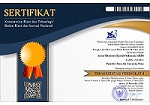Kajian Ekonomi Syariah Perspektif Filsafat Islam
Abstract
This research is a library research by using books and other literatures as the main object. The study in this paper provides a clear, objective, analytical and critical overview of the existing phenomena regarding the development of Islamic economics in Indonesia in the perspective of Islamic philosophy. Currently, there are still some discrepancies between the concept and its application in Islamic Economics. It took a lot of time to find meaning from the concept of Islamic economics through the Islamic law/maqasid sharia approach. The search for meaning is of course through inquiries by involving many researchers both from insiders and outsiders. The concept of maqasid shari'ah is strongly influenced by interpretation, perspective, educational background and depth of religious knowledge.
In the study of the philosophy of the Islamic sciences, one of the efforts to break the stagnation of Islamic economic concepts and thinking is through the deconstruction of critical thinking with a critical paradigm. It is needed to avoid logocentrism (centered on its own logos/way of thinking). Each mahzab of Islamic economics should be aware that religious understanding from nash is essentially only one possible meaning of the many other possible meanings hidden behind the nash. This is to avoid the reality of the sacralization of each other's understanding so that it triggers conflict with the understanding of others. That way, the common thread of the concept of Islamic economics can be found together to be a reference for practice its field.
Keywords; Economics, Islam, Maqasid Sharia, Philosophy.
Keywords
Full Text:
PDFReferences
Al-Jabiri, Muhammad Abed, Takwîn Al-`Aql Al-Arabiy, cet.10, Bairut, 2009.
Aravik, Haris. Sejarah Pemikiran Ekonomi Islam Kontemporer. Tapos, Depok: Kencana, 2017.
Arkoun, Mohammed, Al-Fikr al-Islami: Qiraat al-Ilmiyyah, terj Hashim Shaleh, Beirut: Markaz al-Inma’ al-Qaumy, 1987.
_________________, Al-Fikr al-Islamy: Naqd wa al-Ijtihad, terjemahan Hasyim Shalih. London: Dar as-Saqi. 1990.
_________________, Min Faysal al-Tafriqah ila Fasl al-Maqail: Aina huwa al-Fikr al-Islami al-Mu’ashir, terj Hasyim Sholeh, Dar al Saqi, 1990.
Auda, Jasser, Maqasid al-Shariah as Philosophy os Islamic Law: A system Approach, London: The International Institute of Islamic Thought, 2008.
Chapra, M. Umer, Monetary Policy In An Islamic Economy, dalam Published in Ziauddin Ahmed, et. al. eds., Money and Banking in Islam, Jeddah: International Centre for Research in Islamic Economics, 1983: 1-28.
Culler, Jonathan, On Deconstruction: Theory and Criticism after Structuralism. London: Routledge and Kegan Paul, Ltd. 1987.
El-Ansari, Waleed and Linnan, David K., Muslim and Christian Understanding: Theory and Application of “ A Common Word”, New York; Palgrave Macmillan, 2010.
Faqih, Mansour, Sesat Pikir Teori Pembangunan dan Globalisasi, Yogyakarta: Pustaka Pelajar, 2001.
Guessoum, Nidhal, Islam’s Quantum Question: Reconciling Muslim Tradition and Modern Science, New York: I.B. Touris, 2011, dalam resume perkuliahan.
Karim, Adiwarman Azwar, Sejarah Pemikiran Ekonomi Islam, edisi 3, Jakarta; RajaGrafindo, 2004.
Khun, Thomas, The Structure of Scientific Revolution, Chicago: The Univesity of Chicago Prerss, 1970.
Knott, Kim, “Insider/Outsider Perspectives” dalam John Hinnells (ed.), The Routledge Companion to the Study of Religion, 2005.
Munitz, Milton K.. 1981. Contemporary Analytic Philosophy. New York: Macmillan Publishing Co. Inc. 1981.
Saeed, Abdullah, Interpreeting the Qur’an, Towards a contemporary approache.
Soroush, Abdolkarim, Reason, Freedom, & Democracy in Islam, Translated, Edited, and with a Critical Introduction by Mahmoud Sadri & Ahmad Sadri, Oxford: University Press, 2000.
Undang-undang No. 23 tahun 2011 Tentang pengelolaan zakat.
Undang-undang No. 7 Tahun 1992 tentang Perbankan.
van Ess, Josef, The Logikal Structure of Islamic Theology, McGill University: Institute of Islamic Studies, 1992.
Yusuf, Imtiyaz, Ismail al - Faruqi’s Contribution to the Academic Study of Religion, Islamic Studies, 2014: 99-115.
Ismiati, B., Sani, A. A., & Diniyah, U. S. (2021). Tendensi Wakaf Uang di LWPNU-PWNU YOGYAKARTA. JESI (Jurnal Ekonomi Syariah Indonesia), 11(1), 74-86.
Salam, A. (2021). Analisis pengaruh pendistribusian dana zakat terhadap mustahik ditinjau dengan menggunakan metode CIBEST. JESI (Jurnal Ekonomi Syariah Indonesia), 11(1), 67-73.
Purbowisanti, R., Sani, A. A., & Setiorini, K. R. (2021). Do The Distribution Of Zakat And Islamic Bank Financing Affect Income Inequality In Indonesia? Amwaluna: Jurnal Ekonomi dan Keuangan Syariah, 5(1), 90-102.
Website;
https://id.wikipedia.org/wiki/Paradigma(disambiguasi). Diakses tanggal 28 Mei 2020. Pukul, 20:17.
https://www.cnbcindonesia.com/market/20191115093424-17-115443/terungkap-ini-penyebab-masalah-kronis-di-bank-muamalat. Diakses tanggal 28 Mei 2020. Pukul, 20:17.
www.bankmuamalat.co.id/profil. Profil bank muamalat Indonesia, diakses 1 Juni 2020.
DOI: http://dx.doi.org/10.21927/jesi.2022.12(1).77-89

This work is licensed under a Creative Commons Attribution-ShareAlike 4.0 International License.












